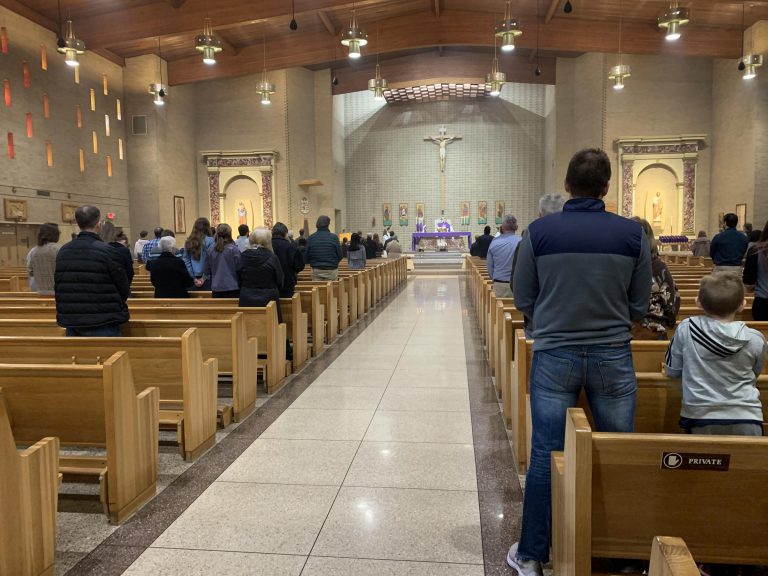As Midwest states limit large gatherings to halt the spread of coronavirus, religious groups have had to adjust. Some congregations are cancelling services altogether; others are changing familiar customs. Side Effects visited a Catholic mass in South Bend, Ind., to see how things have changed.
Mass at St. Matthew Cathedral wasn’t as full as most Sunday mornings.
Still, those who did attend had to adjust to some changes meant to protect churchgoers from the novel coronavirus. Holy water fonts were drained completely and the sign of peace, which is normally given with handshakes, was gotten rid of altogether. All bibles and hymn books were removed from the pews.
That wasn’t a problem for people like Jack and Renee Gordon, who bring their own books to church.
“I go to mass everyday. It’s like breathing to me. It’s part of my inner soul. It’s how I live.”
They’re aware of the health risks that come with contracting COVID-19, especially to elders like themselves. But Renee said now is the time she turns to religion more than ever.
“We believe in the church. We believe churches shouldn’t be closed. This is where people should come.”
The Gordons said they plan to continue attending church as they always have, even though Fort Wayne South Bend Bishop Kevin Rhoades lifted the obligation for Catholics to attend mass through the rest of March. Brian MacMichael is the Director of the Office of Worship from the diocese.
“For Catholics, Sunday mass is a pretty big deal. We all have the obligation to keep the Lord’s day holy,” he said.
MacMichael said the diocese did what it thought was best in the face of COVID-19.
“Dispensing from that obligation was not a decision made lightly. But in this case the concern for public safety and vulnerability, especially of our elderly parishioners took priority.”
St. Matthew Cathedral followed other guidelines released by the diocese. The congregation practiced social distancing by spacing out around the chapel and staggering pews. Instead of passing around a collection basket, ushers came through with baskets that had handles. They’ve also limited music to the Saturday evening and Sunday 11 a.m. service since they need to print out single-use hymn sheets
Receiving communion on the tongue is still an option but it’s strongly discouraged.
Father Terry Fisher said he’s never seen the church take such great measures.
“This is pretty radical for us, to change so much. But the health of the people is the most important so we’ll do what we have to do.”
Fisher was the priest for the Saturday evening service, and some of the Sunday morning services. He said late Saturday and early Sunday were a normal size crowd, but the 9 and 11’olock were significantly smaller.
Fisher says no matter how many or few people show up, he’s happy that they can hold mass at all.
“We’re very lucky. There are places that don’t have mass on the weekends at all now.”
But he said there’s no pressure to make it to church these next few weeks.
“If you are older, if you have a pre-existing condition, please stay home. God understands.”
Fisher recommends some alternatives to attending like watching mass on television, online, or praying at home.
This story was produced by Side Effects Public Media, a news collaborative covering public health.
9(MDM5MjE5NTg1MDE1Mjk1MTM5NjlkMzI1ZQ000))

